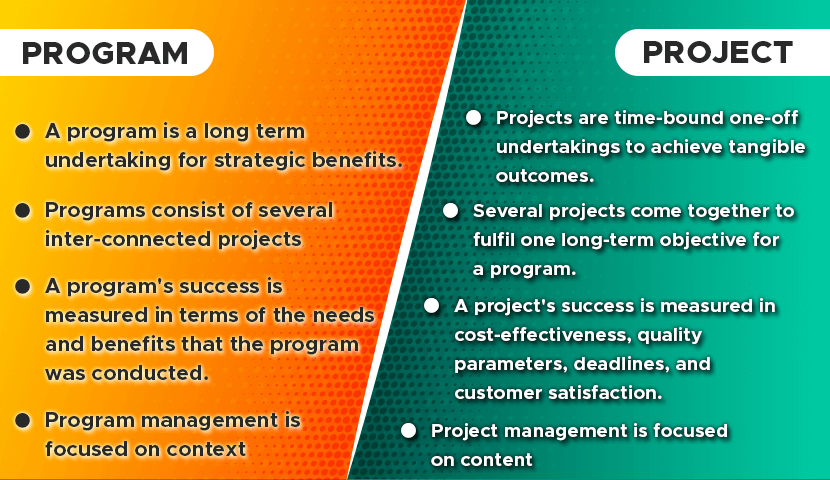By Mrugesh Panchal,

Understanding the difference
Program Manager and Project Manager may sound like similar roles, but there are critical differences between them. Both roles are essential to the long-term objectives of an organization and are interlinked in many ways. It is necessary, therefore, to understand the difference between the two positions.
Program Vs Project
A program is a collection of many projects and is directed towards the accomplishment of long-term organizational goals. A project is one section out of many in the actual work body and is a focused effort towards a specific deliverable within the program. Here are some different characteristics of both –

To understand the distinction between a program and a project, let’s take the example of building a house. The program is to build a house to live in. The different projects within this program could be wiring the electrical connections, installing the plumbing, making doors and windows, etc.
While developing tools and IT solutions for our clients, the QuickScrum team is mindful of the program-project distinction. All our intelligent tools offer different dashboards, views, and analytical parameters for data insights, related programs and projects.
Program Manager Vs Project Manager
Both the program manager and project manager are critical roles in an organization. They hold different but critical positions and have their own ways of contributing to the company’s success. Let’s take a look at both these roles individually before comparing a program manager and a project manager.
What is a Program Manager?
A program manager is responsible for defining the strategy and objectives of a program. They outline the vision that the organization hopes to achieve with the successful completion of the program. The program manager also spells out the list of related projects that will comprise the program.
Taking our example of building a house forward, we can say that the program manager is the architect who creates the blueprints and floorplan for the house. Just as an architect would not be engaged in painting the house walls, the program manager does not work directly on projects within the program – but oversees everything.
They are responsible for hiring the right people who will work on the program, defining a budget, determining the returns on the investment, strategizing and other initiatives that impact several projects at once.
Let’s look at some fundamental aspects of a Program manager‘s job –

1. Purpose
The program manager is supposed to look at the big picture and think of the broad impact the program can make on the organization. They must strive for the success of all the projects within the program and work towards the organization’s long-term goals.
2. Responsibility
The program manager is responsible for overall company goals. Their focus is internal and external to ensure that best practices are followed, processes are efficient and effective communication with customers. Program managers should be clear about the strategic direction of the organization and take decisions accordingly.
3. Roadmap
Program managers create a roadmap spanning the entire length of the program. This includes defining the different projects within the program and creating a plan for them.
4. Metrics
Program managers deal with metrics that describe the ROI of the entire program. This includes estimating the associated risks, planning for risk mitigation, and resource utilization.
What is a Project manager?
Project managers are primarily responsible for the operations of an individual project within a program. A project manager‘s role is more skill-oriented and related to planning in any organization. They are responsible for completing tasks, improving operational efficiency, delegating responsibilities, and staying within the budget.
If building a house is a program, plumbers, electricians, painters, and engineers are project managers. In a typical program-project scenario, project managers will report to software program managers. In software development companies, project managers are responsible for defining a project’s goals, driving the team to achieve the goals, communicating the scope and parameters of the project, and meeting the stakeholder expectations.
QuickScrum tools such as the Scrum Board and Kanban board help keep all project communications in a single, easily referenceable thread to facilitate a project manager’s job.
A description of the fundamental points in a Project manager‘s role is given below –

1. Purpose
The Project manager‘s thinking is tactical and detail-oriented. Project managers are required to coordinate cross-functional work to complete the deliverables on time and within the budget. They have a set start and end date for the project, and their job is to achieve the same in keeping with the pre-defined standards of quality.
2. Responsibility
Resource planning, defining the project scope, scheduling the work, and budgeting for the project are some of the project manager’s primary responsibilities. Their focus is always on the internal aspects of the organization and the team.
3. Roadmaps
For a project manager, the road-mapping exercise is limited to the project deadlines. Project managers also help identify bottlenecks, track the project’s progress, work in tandem with interconnected projects, and monitor operational efficiencies.
4. Metrics
Some crucial metrics that project managers need to keep an eye on include schedules, budgets, resource utilization, and workforce planning.
Based on the differing roles of a program manager and project manager, the management software and tool used should have different rights of use, separate templates and work views for each. Keeping with the concept, QuickScrum tools are structured to enable efficient monitoring for various projects in your organization and the overall programs.
Conclusion
In the end, the three main differences between a program and a project manager are –
- A program manager supervises a group of projects; a project manager oversees one individual project, which is a part of a program.
- Program managers focus on long-term objectives, and project managers focus on short-term tangible deliverables.
- Program managers think strategically, project managers think tactically and focus on details.
Even though a program manager and project manager’s day-to-day work differs significantly, people working in both these roles need to have good management skills, organizational skills, and efficiency to perform their job correctly. The program manager and project manager may be working towards differently defined goals in the short term, but their objectives coincide with the overall company objectives in the long term. In understanding program manager vs project manager roles, we must also accept that both these roles’ challenges and obstacles are similar.
